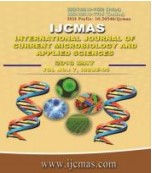


 National Academy of Agricultural Sciences (NAAS)
National Academy of Agricultural Sciences (NAAS)

|
PRINT ISSN : 2319-7692
Online ISSN : 2319-7706 Issues : 12 per year Publisher : Excellent Publishers Email : editorijcmas@gmail.com / submit@ijcmas.com Editor-in-chief: Dr.M.Prakash Index Copernicus ICV 2018: 95.39 NAAS RATING 2020: 5.38 |
The brinjal variety Hisar Shyamal (H-8) is popular among farmers in the state of Haryana and neighbouring states of India. It experiences huge losses in fruit yield as it is not resistant to devastating seed borne diseases viz. damping off and fruit rot caused by Phomopsis vexans in addition to other mycoflora. Seed treatment with chemical fungicides like carbendazim is a common practice to control these seed borne diseases of brinjal. However, continuous use of these chemical fungicides are not safe both environmentally and human health point of view. Therefore, we have evaluated different plant oils and bio-fungicides as seed treatment for control of Phomopsis vexans and other mycoflora as an alternative eco-friendly measure. The results revealed that the healthy seed not only affected by P. vexans but also by other mycoflora viz. Aspergillus, Alternaria, Penicillium and Cercospora. Seed treated with neem oil (5 ml kg-1 seed) and Trichoderma viride (10g kg-1 seed) found effective in controlling the infection caused by P.vexans comparable to that of carbendazim with an improved shoot growth. Hence, seed treatment with neem oil (5 ml kg-1 seed) and Trichoderma viride (10 g kg-1 seed) are effective alternatives to the chemical fungicide, carbendazim in view of safe environment.
 |
 |
 |
 |
 |